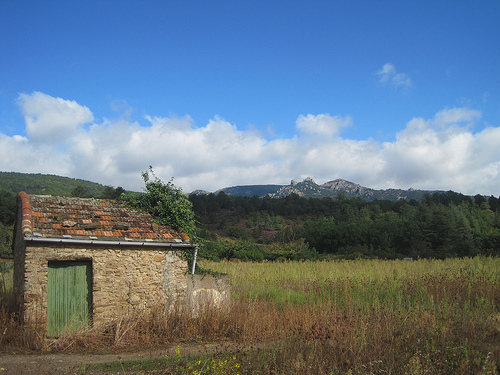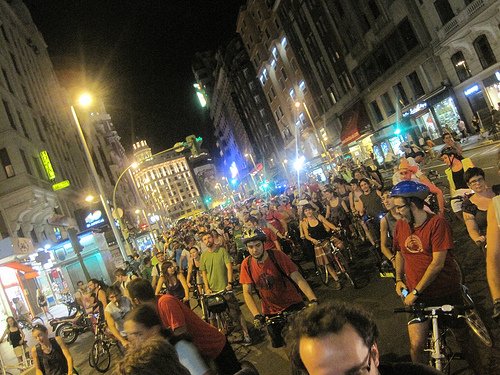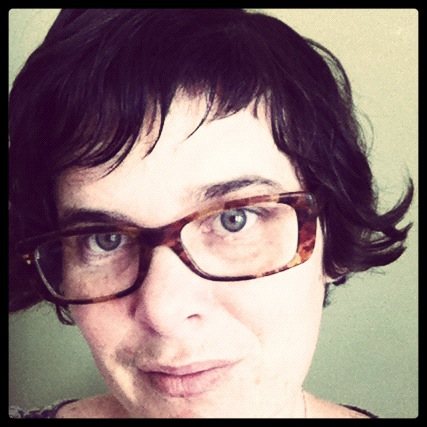Sometimes, all you need is a perfect field. In the field, there’s a strangely comforting smell of sheep poop and fur left behind by the last herd that passed through. There’s a small grove of oaks and above them, stars. It’s quiet except the small wet wind you can hear pass you by in the cool autumn night.
I wanted to find a perfect field. Instead, Max and I were on a busy road surrounded by agricultural land. The road was lined with small tracts elbowed up against one another and plotted with orderly rows of irrigation ditches, olive trees, and almond trees. Most of the lots were fenced in with thin barbed wire; some were guarded by dogs. Even if we could get to them, none of the trees we saw had leaves enough to hide our big orange tent, or the two tired people who needed very badly to sleep inside it. It was getting dark already. For hours we rode up, through, and over tremendous hilltops and villages, chasing the smoking shadow of Mt. Etna while we navigated cracked country roads and disregarded the constant chorus of honks that accompanied us. I was physically and emotionally done with the day. But first, I had to find a place to lie down.

Field camp.
Improvisational Accommodations Rule #1:
Be afraid, or don’t be afraid. Either way, you’ll eventually fall asleep.
“Fear, to a great extent, is born of a story we tell ourselves, and so I chose to tell myself a different story from the one women are told. I decided I was safe. I was strong. I was brave. Nothing could vanquish me. … Fear begets fear. Power begets power. I willed myself to beget power. And it wasn’t long before I actually wasn’t afraid.”
-Cheryl Strayed, Wild
When I talk about setting off on a 3,500-mile bike trip with no training, minimal funds, and no reservations, people often ask: “Weren’t you scared?” The questions continue: Isn’t it scary to camp outside of legal campgrounds? To travel through strange cities where you don’t know which neighborhoods are “good,” to have to rely on the whims of complete strangers for basically everything? There’s an unspoken challenge in such a question that often inspires me, in my role as the carefree traveler in this scenario, to respond, “No way, it’s not scary at all!” Which is to say, I lie.

A tiny house in France.
It is scary for me.
I am deeply afraid of not knowing where I’ll sleep next. Chalk it up to burnout from a nomadic decade during my twenties, to general nerves, or a childhood spent carrying around a backpack of clothes and switching from Mom’s house to Dad’s every week — the psychological roots of my fear aren’t much help when I’m knee deep in a field searching for a flat patch of ground to sleep on that isn’t visible from the highway.
Bike touring without “free camping” is certainly possible, but it requires more money and more advance planning than Max and I had. Free camping is also perfectly suited to a mode of travel in which you never really know where you’re going to end up, but you know that navigating the traffic of a strange city at the end of the day, hunting desperately for cheap accommodations, is where you don’t want to be.

Searching for a field after a long day.
Besides, free camping embodies the reasons I decided to travel in this manner: To be open to new experiences, leave behind the grind, and accept what the world has to share with me. To leave no trace. It’s an essential component of being on the road: choosing to step off the road when you are tired, wherever you are, and carve out a place of rest in the very terrain that surrounds you. Power begets power. You’re as safe out here as you are anywhere else, I told myself not so reassuringly every time the fear took hold. And I kept looking for the perfect field.
We did find a place to sleep. We always did. That night it was an abandoned farm behind a burned-out brick building with old olive trees so heavy they drooped to the ground, providing a spooky but acceptable camouflage for our tent. When I awoke the following morning after fitful sleep, I looked out of the tent and saw the autumn mist mingling with the smoke from the volcano on the horizon, and felt completely at ease. Then I got up and began the process all over again.
Improvisational Accommodations Rule #2:
Ask for water and you just might get wine.

Egg and wine.
We only slept outside about half the nights of our six-month trip; we paid for lodging about half the time, as well. All told, we relied on a rotating mix of free camping, hospitality networks, paid campsites, random kindness, and community connections to get us through the months. In each country we visited, we chose our accommodations based on weather and the local economy.
Municipal campsites were plentiful and cheap in France; in Spain, campsites were expensive and packed with partying summer vacation crews of young people, so we turned more often to Warmshowers, the hospitality network for cyclists. Pensãos in Portugal are reasonably priced, and free camping is easy. By the time we rode across the Italian island nations of Sardegna and Sicily, it was autumn — campsites were closed and hotels were mid-rate, but the people were incredibly friendly, so we often just asked residents if we could camp on their land.
Here’s the secret to discovering hospitality on the road: Ask. Ask people for a glass of water, a moment in the shade of their front yard, a suggestion or a patch of grass on which to pitch your tent. Talk to them, tell them your story, and listen to theirs.

An American breakfast at Manel's.
We collected people’s stories along with what they shared with us: Germano the cork factory worker, whose mother and wife conjured up a five-course Italian meal from practically nothing in a small apartment off a vineyard in a rainstorm. Manu, who gave us his apartment in Salamanca for two days and went and stayed at his girlfriend’s house. Francis, a fellow cyclist, who showed us his secret swimming hole in the hottest days of the summer. Fran, an artist who hosted us at her fairytale country maison in Normandy and cooked us what is possibly the best meal I have ever eaten. Manel, the laid-back biker guy in Galicia who gave us a spare key and encouraged us to get comfortable with his shaggy dog, grumpy cat, and collection of Tom Waits albums.
And Giovanni. Giovanni is a shepherd in Sardegna. A veteran of the foreign service, a poet, and a speaker of three languages, at 30 years old he has returned to his native town to share shepherding duties with two grizzly compatriots. Every morning he rides his old mountain bike from his home in town to the fields at 4am, rousing the mixed herd of sheep, goats, chickens, and a couple of cows. He and his two comrades sit in the shelter of a one-room stone hut all day, where they make cheese, drink homemade wine, and talk. Giovanni reads and writes letters to pen pals he met while studying abroad. He prays. Then goes home, eats plain pasta alone, and does it all over again the next day.

Going to Giovanni's pasture, Sardegna.
When we came across the shepherds’ hut in the middle of nowhere after a long, rainy day, we asked Giovanni for water. Instead, he gave us wine and raw eggs to eat, and let us spend the night in his perfect pasture, at peace beneath the oak trees among the smell of damp wool.
This is the type of generosity, the unfettered sharing, to which we became accustomed.
Improvisational Accommodations Rule Above All Other Rules:
Say yes.

Harvesting olives with Jen and Didier's neighbors, South of France.
It wasn’t always easy for me to be improvisational when it came to finding shelter, but it was always okay. No police came to arrest us. No murderers came in the night. We had to throw a few rocks at a howling pack of stray dogs once, but by morning those fierce beasts had settled into a big fuzzy puppy pile, keeping guard over us from beneath a nearby tree.
There were nights when we paid way too much for a hotel because I didn’t want to go through the requisite negotiations with my fear. There were times when we asked people if we could stay on their land, and they said no. Sometimes we argued about it. But we always did find a place to sleep, and no matter how late I stayed up flinching at every crunch and whisper of the outside world around our tent, I always ended up awake and at peace in the morning.

Critical mass in Madrid with our hosts.
As Max is fond of saying when quizzed about travel experiences: Most people in the world are nice, a few people are really nice, and a very select few are assholes. Barring the rare scenario when you’re truly in danger — when your gut tells you it’s a bad idea — there’s an easy response when someone invites you in, offers you something to eat, or wants you to stay and talk with them for three hours instead of proceeding to your next destination: Say yes.
And if the road just off the edge of your map tempts you by looking a little bit calmer, if your partner needs a rest but you don't, if you’re wondering whether that hill is going to get any steeper, or a crazy person like me asks you to quit your job and ride your bike across a couple of countries just for the heck of it with no plan?
The answer, on the road, is usually, always, yes.
Resources: Free camping / wild camping / stealth camping

Free camping offers flexibility; no cost; adventure; a workaround to avoid the overly commercial aspects of travel; new insight into previously ignored scenery; the pleasure of waking up under an olive tree and eating cold breakfast by the side of the road. Travelling Two has a tip sheet for cyclists who want to stealth camp.
Downsides: See fear, above. Limited access to water sources/showers can also be difficult.
Warmshowers and other hospitality networks
Despite its somewhat odd name, Warmshowers.org is not a fetish website — it's a hospitality network for bicycle tourists. The nonprofit works just like other hospitality sites (it's free), and all the users share a love of, or support for, traveling by bicycle. There’s no better way to experience culture, food, and off-the-tourist-path locations. And Warmshowers hosts are more likely to understand your unique travel needs: you’ll eat seemingly disgusting amounts of food immediately on arrival, store giant bicycles in their homes or yards, do laundry, and smell not so fresh upon arrival.
Downsides: It takes some advance planning, reliable internet access, and predictable travel times in order to make plans with someone in advance. It’s also sometimes taxing to negotiate the finer points of guest/host etiquette when you’re mentally and physically exhausted from the road and, say, your host wants to take you out to a bar that doesn’t open until 1am.
Campgrounds
In Western Europe, camping is common. In France, it’s also a noun. Well-tended public and private “campings” provide bike travelers a reliable source of showers, electricity, and ease of mind for often little cost. More “RV park” than “national park," campgrounds can be a great way to sleep securely without breaking the bank, and an easy and fun way to interact with other travelers.
Downsides: La Saison, as the French call the European vacation season. In Europe, as well as many other parts of the globe, people get several weeks off work, usually in July or August Prices double or triple, campgrounds fill up, and you should really let go of any expectations of sleep, especially if you’re lodged near that party of drunk students who’ve just set up a complete sound system in their campsite.

Other Human Beings
The two old men who showed us to their town square and indicated with (correct) certainty that we could camp there unmolested. All the people who pulled us off the street and into their homes. My third cousin’s friend’s French boyfriend; the fruit seller and her dog, Sting; my mom’s old friend college best friend who never left Paris after her study abroad semester there. Canvass your friends and community, ask around, be open to invitations, and you might be surprised by the generosity of strangers.
Downsides: There are really very few downsides to other human beings.
###
The Precariat's Guide to Biking Across Europe
In 2010 Manjula Martin and her partner set out to see the world the old-fashioned way: by bicycle. Over the course of five countries and 3,500 miles, they discovered an infinitely shareable world populated by people happy to share what little they had.
• Part One: The Precariat's Guide to Biking Across Europe
• Part Two: Bike Nomad, Where Did You Sleep Last Night?
• Part Three: A Bicycle Nomad Prepares for Re-Entry









